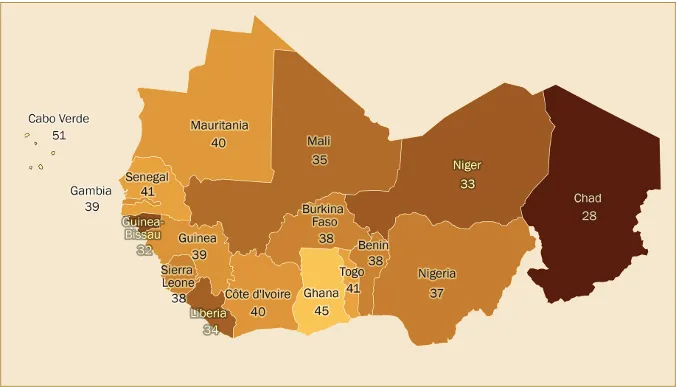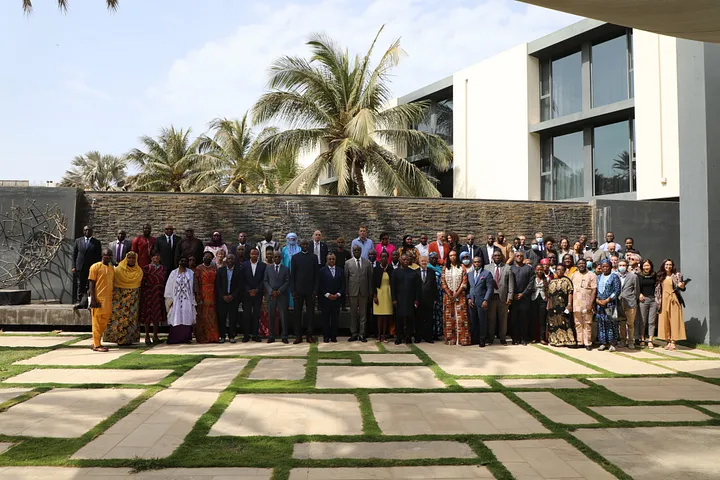

Across the diverse countries and ecosystems of West Africa and the Sahel, climate change is emerging as a structural factor shaping peace and stability.
Each year, the region experiences major climatic shocks, including rising temperatures, erratic rainfall, and extreme weather events such as heatwaves, droughts, and floods. According to the latest assessment from the Intergovernmental Panel on Climate Change, these shocks will accelerate in the years to come, with far-reaching consequences for planet and people.
The effects of climate change in West Africa and the Sahel are already dire and could get much worse. The coping capacity of States and communities in the region is limited and dependence on climate-exposed natural resources — such as land or water — is high. The World Bank estimates that without concrete action, slow-onset climate stressors such as sea-level rise and desertification could internally displace up to 32 million people in West Africa by 2050, while a study by the International Society for Environmental Epidemiology (ISEE) warns that more than 60% of West African countries could face water scarcity by 2025. Thirty-three million people are already classified as food insecure in the region as climate change continues to degrade agricultural fields and diminish crop yields.

Given that climate and security risks are mutually reinforcing, the UN Department of Political and Peacebuilding Affairs (DPPA) has in recent years devoted increasing attention to this link. Indeed, most of the UN’s field-based Special Political Missions (SPMs) are deployed in highly climate-vulnerable countries.
In a recent statement, the Security Council stressed the need for comprehensive risk assessments and long-term strategies to address climate change, ecological changes, and natural disasters. The United Nations Office for West Africa and the Sahel (UNOWAS) is one of 11 UN field missions that have it in their mandates to consider the destabilizing effects of climate change.
UNOWAS has strengthened efforts to incorporate the linkages between climate change, peace and security into its analysis and activities aimed at conflict prevention, mediation, and sustaining peace, in particular in the context of farmer-herder conflicts. Partnerships across the UN system and with stakeholders at the regional, national, and local levels have been critical. To carry out locally-informed climate security risk assessments, UNOWAS has been collaborating with civil society groups and research centers across the region, including with the West African Science Service Centre on Climate Change and Adapted Land Use to draw on the expertise of African university students enrolled in climate science studies, and with implementers of nature-based solutions, such as the One Billion Trees for Africa. Working closely with the Economic Community of West African States (ECOWAS) and its members, UNOWAS has examined the causes and possible solutions to pastoralism-related conflicts in the region. Field-based research conducted in Burkina Faso, Guinea, Mali, Mauritania, Niger, and Nigeria identified land tenure rights, early warning, and inclusive community-based conflict prevention and resolution mechanisms among the critical elements to promote peaceful co-existence.
With support from the UN’s Climate Security Mechanism (CSM), UNOWAS has been able to temporarily deploy additional capacity on climate security and will soon join the growing number of UN field missions with a full-time Climate Security Advisor.
The incoming Advisor will play a key role in advancing the Regional UN Working Group on Climate Change, Security, Environment and Development. UNOWAS established that panel in June 2021 together with the United Nations Framework Convention on Climate Change (UNFCCC), the UN Environment Programme (UNEP) and the International Organization for Migration (IOM) to promote knowledge sharing and enhanced coordination on this agenda.
Dedicated capacity will also allow UNOWAS to expand its research efforts in this area (pilot climate security risk assessments have been conducted in Liberia, Mauritania, Niger, Nigeria, and Senegal, with ten more planned), deepen relationships with local communities to better understand their perception of climate risks, and promote inclusive decision-making that involves youth and women-led organizations. Findings from the five pilot climate security risk assessments conducted so far were recently presented at the first-of-its-kind Regional Conference on Climate Change, Peace and Security in West Africa in Dakar on 6–7 April 2022. Co-organized by UNOWAS, ECOWAS, Ireland, and the Republic of Ghana, the conference brought together over 100 participants — including policymakers, researchers, and representatives from governments and civil society — to discuss the confluence of climate and security risks in the region. A special focus was placed on the distinct impact on different population groups, including the need for inclusive strategies to address the particular concerns of women, children, and migrant populations.

Participants took stock of ongoing efforts in the region, such as national climate policies and action plans, a series of climate-informed peacebuilding projects, including those funded by the Peacebuilding Fund, and regional sustainability initiatives, including the Great Green Wall. Participants also identified challenges hampering their successful implementation, such as insufficient volume of and access to climate finance and laid out concrete measures to strengthen existing adaptation efforts. The importance of tapping into local knowledge and practices was highlighted as a key priority. Several examples were shared relating to conflict resolution and natural resource governance mechanisms, such as Niger’s multi-level and multi-stakeholder land commissions, which include both administrative and customary authorities. Other examples revolved around efficient soil and water restoration techniques, such as “half-moon” water catchments that reduce water run-off during the rainy season and support crop production.
The conference concluded with a Call to Action addressed to the Governments of the sub-region, regional and international organizations, the United Nations system, development agencies, and international finance institutions calling for more evidence-based analysis and policymaking involving local communities, stronger partnerships, and leveraging climate finance for sustaining peace. UNOWAS is expected to make full use of its mandate and convening power to play a critical role in implementing the Call to Action, jointly with partners from across and beyond the UN system.
Originally published on medium.com